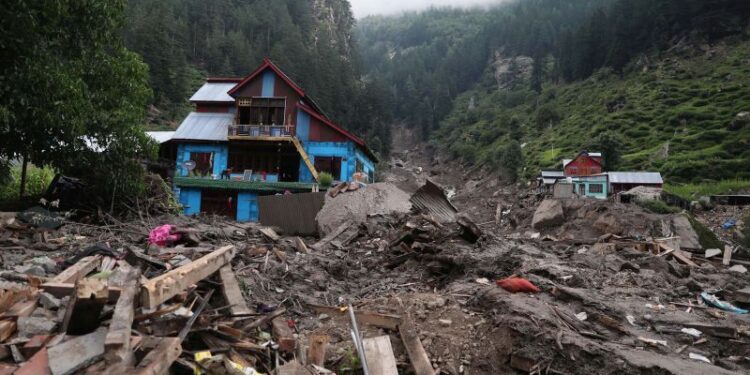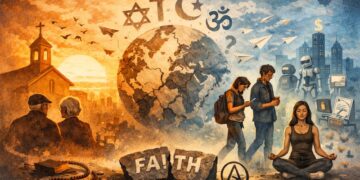On 14 August, when people across India were preparing for Independence Day, the people of Chasoti village in Padder, Kishtwar (J&K) faced an unimaginable tragedy. A sudden cloudburst shook the valley. Within minutes, heavy rains turned into deadly flash floods. Houses were swept away, roads broken, vehicles destroyed, and yatris along with villagers caught in the fury of nature. The peaceful night turned into a nightmare filled with cries for help, fear, and painful loss.
Yet, even in the middle of this tragedy, stories of courage, compassion, and humanity shone like rays of light. When the waters washed away homes, it could not wash away the strength of the human spirit. Many brave hearts rose above fear and risked their lives to save others. These were the unsung heroes of Chasoti — the Army, Police, SDRF, NDRF, NGOs like Ababeel and Tariq Memorial Trust, local youth volunteers, and dedicated civil officers like ARTO Kishtwar, Tasleem Wani.
The 17 Rashtriya Rifles and Kishtwar Police were the first to respond. Despite broken roads and dangerous landslides, they started rescue operations immediately. They were joined by doctors, paramedics, engineers, and other officials who left no stone unturned. For them, time was precious and every minute mattered because lives were at stake.
The Army not only rescued stranded villagers and yatris but also treated the injured, arranged shelter, and gave food, water, and blankets. By morning, they had cleared paths, made makeshift bridges, and restored hope. They did not wait for big machinery; instead, they used their hands, tools, and courage. Their silent message was powerful: “No one will be left behind.”
True heroism is not always about big speeches. It is seen in the small but life-changing acts — carrying an injured person on the shoulders, feeding a hungry child, or holding the trembling hands of someone in despair.
While the Army gave strength, Ababeel NGO gave compassion. Founded in 2015 by Adv. Hassan Babur Nehru, Ababeel has been active in every crisis in the Chenab Valley. The moment news of the cloudburst spread, Ababeel rushed seven ambulances and teams of volunteers to Chasoti. They carried food, blankets, medicines, and most importantly, empathy. They worked shoulder-to-shoulder with Army, Police, SDRF, and NDRF. Their motto was clear — no one should remain hungry, helpless, or forgotten.
The name Ababeel itself carries deep meaning. In Islamic history, the Ababeel birds defended the Ka’ba from destruction, despite being small and fragile. Similarly, the Ababeel volunteers may be ordinary people, but in Chasoti, they stood as protectors, showing that true service knows no caste, religion, or boundary.
Among the countless moments of humanity, one picture from Chasoti moved hearts across India. It showed Shahnawaz, a jawan from SDRF, cradling a small child whose parents had gone missing in the floods. The child had lost everything in one night, but in the arms of Shahnawaz, he found comfort and protection. That image was more than just a rescue scene — it was a symbol of love, trust, and humanity. It reminded us that in the face of destruction, humanity still wins.
The Machail Mata Yatra was going on when the cloudburst struck. Many pilgrims were stranded and many children separated from their families. The efforts of SDRF and NDRF were tireless. They worked day and night, wading through water, clearing rocks, and climbing dangerous slopes to search for the missing. For them, every life mattered.
Equally inspiring was the role of civil officers like ARTO Kishtwar, Tasleem Wani. From the first moment, he was on the ground, helping pilgrims and villagers. He arranged vehicles, guided yatris, and personally ensured that travelers reached home safely. His dedication was not about duty alone; it was about humanity. A photograph of him sitting on the roadside, eating a simple meal after hours of non-stop work, became a symbol of true leadership. It showed that real leaders do not lead from behind desks but from the ground, standing shoulder-to-shoulder with their people.
Local youth volunteers also became a lifeline. With no training, no equipment, and often risking their own safety, they dug through mud, pulled people from debris, and carried supplies. Their courage proved that when disaster strikes, even ordinary villagers can become extraordinary heroes.
Doctors and health workers played another vital role. In makeshift camps and roadside shelters, they treated the injured, comforted the grieving, and protected people from disease. In the middle of chaos, their calmness gave reassurance.
What made the Chasoti rescue special was unity. Army, Police, SDRF, NDRF, NGOs like Ababeel, Tariq Memorial Trust, civil officers, doctors, youth volunteers, and common villagers all came together. No one asked who belonged to which religion, caste, or region. The only question was: “Who needs help?”
The Chasoti cloudburst will always be remembered as a tragedy — for the lives lost, the homes destroyed, and the grief left behind. But it must also be remembered for the spirit of humanity that rose in its aftermath. It should be remembered for the nameless soldier who lifted a child, for the volunteer who carried food on his back, for the officer who guided yatris through the night, and for the villagers who dug with bare hands to save their neighbors.
Disasters test the strength of people, and in Chasoti, people passed that test with unity, courage, and compassion. Nature showed its fury, but human beings showed something greater — the spirit of resilience and love.
The cloudburst may have washed away roads and homes, but it also revealed the road to humanity, where everyone walks together, hand in hand, as one family.
The writer is Coordinator IGNOU Special Study Centre, Centre No 1264D Changa Bhalessa Doda J&K




